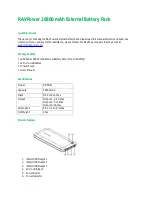
Operating Instructions
1
01583G
24 VOLT FULLY AUTOMATIC
DUAL MODE BATTERY CHARGER
MODEL 18830
TYPE 24EL12-3ET
Specifications
AC Supply:
90-125 / 180-250 volts, 50/60 Hertz, single-phase, 6.5 amps maximum
DC Output:
24 volts, 12 amps tapering to 3 amps
Battery Capacity:
Two series connected 6 cell, 12-volt deep-cycle motive power batteries; gel cell
and sealed "maintenance-free" or conventional replaceable electrolyte deep-
cycle batteries
Battery Size:
50 to 150 amp hours
Normal Recharge Time:
8 hours
PLEASE SAVE THESE IMPORTANT SAFETY AND OPERATING INSTRUCTIONS
For correct operation of the equipment, it is important to read and be familiar
with this entire manual before installing and operating the charger.
DO NOT DISCARD THIS MANUAL AFTER READING.
LOOK FOR THIS SYMBOL TO POINT OUT SAFETY PRECAUTIONS. IT MEANS:
BECOME ALERT—YOUR SAFETY IS INVOLVED.
IF YOU DO NOT FOLLOW THESE
SAFETY INSTRUCTIONS, INJURY OR PROPERTY DAMAGE CAN OCCUR.
Features
•
Charger output characteristics are adjustable to charge gel cell and sealed or conventional replaceable liquid electrolyte
deep-cycle lead-acid batteries. A switch on the front of the charger selects different charge characteristics.
•
Patented electronic circuit monitors battery state of charge and automatically turns charger off when the batteries reach full
charge.
•
Line voltage compensation produces consistent charger output for AC supply voltage variations of ± 3% from nominal.
•
Convection cooled design for maximum reliability and minimum maintenance.
IMPORTANT SAFETY INSTRUCTIONS
Before using battery charger, read all instructions
and caution markings on the battery charger, battery
and all equipment using the battery. Use of an
attachment not recommended or sold by battery
charger manufacturer may result in a risk of fire,
electric shock, or injury to persons.
INTRODUCTION
The Dual-Mode battery charger is designed to
recharge deep-cycle batteries of conventional
replaceable electrolyte or gel cell and sealed
"maintenance-free" design. The different charge
characteristics required by these different types of
battery design are selected by sliding the "BATTERY
TYPE" selector switch to the correct setting. A



























